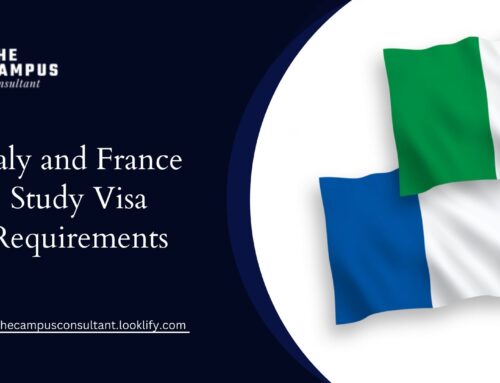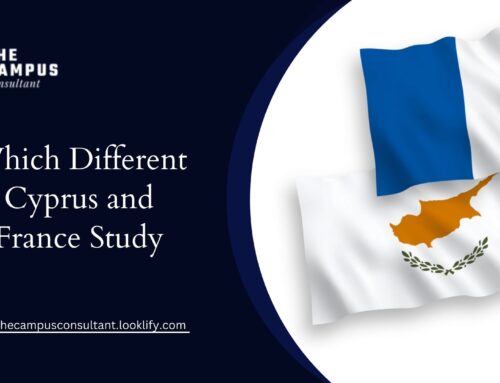Introduction
France is a popular destination for international students, renowned for its world-class education and vibrant cultural scene. Navigating the visa requirements is a crucial step for those aspiring to pursue academic endeavors in this European nation. The primary visa for international students in France is the “Student Visa” or “Visa de long séjour pour études.” To obtain this visa, applicants must have an acceptance letter from a recognized French educational institution and demonstrate financial capability to cover living expenses. Additionally, students may need to provide proof of health insurance and accommodation arrangements. The process involves submitting an online application through the Campus France website and attending a visa interview at the French consulate or embassy in their home country. Familiarizing oneself with these requirements ensures a smooth transition into the French academic landscape and enhances the overall study abroad experience.
Types of Student Visas
1. Short-stay Visa (Visa de Court Séjour Étudiant)
For programs lasting less than 90 days, such as language courses or short-term research projects, international students must apply for a short-stay visa. This allows for temporary residence and study within the specified duration. The Short-stay Visa, also known as Visa de Court Séjour Étudiant, is a crucial document for international students planning to study in France. This visa is specifically designed for short-term academic programs lasting up to 90 days. It grants access to quality education and cultural experiences in one of Europe’s academic hubs. To obtain this visa, applicants must demonstrate enrollment in an approved institution, provide evidence of accommodation arrangements, and display financial capability to cover their stay. The Short-stay Student Visa serves as a gateway for individuals eager to explore French academic opportunities and immerse themselves in the rich cultural tapestry of the country.
2. Long-stay Visa for Studies (Visa de Long Séjour Étudiant)
For academic programs exceeding 90 days, the long-stay student visa is imperative. This visa necessitates a more thorough application process and is applicable to degree-seeking students. The Long-stay Visa for Studies, commonly known as Visa de Long Séjour Étudiant, is an essential document for international students embarking on extended academic journeys in France. This visa is tailored for programs lasting more than 90 days, such as degree courses or research programs. Applicants are required to provide proof of enrollment in a recognized educational institution, demonstrate secure accommodation arrangements, and exhibit financial means to sustain their stay. The Long-stay Student Visa opens doors to a comprehensive French academic experience, offering students the opportunity to delve into their chosen fields while immersing themselves in the vibrant French culture for an extended period.
Application Process
Navigating the French visa application process can be intricate, but with our guidance, you’ll find it manageable.
1. Collecting Required Documents
To initiate the application, gather essential documents:
- Passport: Ensure it is valid for the duration of your stay.
- Letter of Admission: A formal acceptance from your academic institution.
- Proof of Financial Means: Showcase your ability to cover living expenses.
- Travel Insurance: Comprehensive health coverage is mandatory.
- Proof of Accommodation: A confirmation of where you’ll reside during your studies.
2. Online Application Submission
Complete the online application form on the official French government website. Provide accurate details and upload the required documents. Access the official website of the French consulate or embassy in your home country to initiate the visa application process. f required, create a user account on the online visa application portal. Provide accurate information and keep your login credentials secure. Choose the appropriate visa category, whether it’s the Short-stay Visa (Visa de Court Séjour Étudiant) or the Long-stay Visa for Studies (Visa de Long Séjour Étudiant).
3. Booking an Appointment
Once the online application is submitted, schedule an appointment with the nearest French consulate or embassy. Attend the appointment with all necessary documents. Go to the official website of the French consulate or embassy in your home country. Look for the section related to visa services Locate the online appointment booking system on the website. This might be under a section like “Visa Services” or “Appointments. “Some consulates may require you to create an account on their online system. Follow the instructions to register, providing accurate details.
4. Visa Interview
Prepare for a visa interview where you may be asked about your academic plans, financial stability, and accommodation arrangements. Be articulate and honest in your responses. Arrive at the consulate or embassy well in advance of your scheduled interview time. Punctuality demonstrates responsibility and respect for the process. Carry all original and photocopies of the required documents, including your visa application form, proof of enrollment, financial statements, passport, and any additional documents specified by the consulate.
Financial Considerations
France requires students to demonstrate they can cover their living expenses during their stay. This includes tuition fees, accommodation, and daily expenses. It’s advisable to maintain a dedicated bank account for this purpose and provide evidence of sufficient funds during the visa application. Clearly understand the tuition fees for your chosen course. Ensure you have the financial means to cover these costs for the entire duration of your studies. Estimate and provide evidence of your ability to cover living expenses, including accommodation, food, transportation, and other day-to-day costs. Consulates often require proof of a certain minimum monthly or annual amount. Submit recent and detailed bank statements demonstrating your financial stability. Ensure these documents align with the specific requirements outlined by the French consulate or embassy.
Accommodation Guidance
1. University Accommodation
Many universities offer accommodation options for international students. Ensure you apply for on-campus housing well in advance to secure a spot. Universities often offer on-campus accommodation, providing convenient living spaces within or near the campus. These may include dormitories, apartments, or shared housing. To secure university accommodation, students typically need to apply directly to the university’s housing office. This process may involve completing an application form, specifying preferences, and adhering to deadlines. On-campus options vary and may include single or shared rooms, furnished apartments, or residence halls. Some universities also provide family accommodation for students with spouses or dependents. University accommodation often comes with essential facilities and amenities such as Wi-Fi, common areas, laundry services, and access to academic resources. Some may also have meal plans or shared kitchens.
2. Private Accommodation
If you opt for private accommodation, ensure it meets the French standards for student housing. Provide documentation confirming your residence arrangements during the visa application. Private accommodation can include renting apartments, houses, shared flats, or individual rooms from private landlords or through real estate agencies. Students have the flexibility to choose based on their preferences and budget. Utilize online platforms and websites dedicated to rental listings to search for available properties. Websites like real estate portals, student accommodation platforms, and local classifieds can be valuable resources. Private accommodation comes with varying costs, and students should establish a budget that includes rent, utilities, and any additional fees. Consideration of the overall cost of living in the chosen area is crucial.
Health Insurance
France places great importance on the health and well-being of its residents, including international students. Securing comprehensive health insurance is mandatory and should cover medical expenses for the entire duration of your stay. Students need to conduct thorough research to find suitable private accommodation options. This involves exploring rental listings, considering location, amenities, and costs, and ensuring the chosen place aligns with individual needs. Many countries, including France, typically require international students to have health insurance coverage as a mandatory condition for obtaining a student visa. There are two main types of health insurance for students – the national health insurance scheme provided by the host country, and private health insurance plans offered by various providers.
Summary
Navigating the visa requirements for studying in France demands meticulous preparation. , we are dedicated to facilitating this process for our international students. By following our comprehensive guide, you equip yourself with the knowledge needed to ensure a successful visa application and a fulfilling academic journey in France.







Leave A Comment